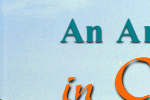 |
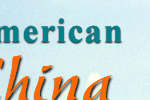 |
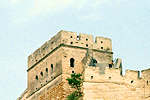 |
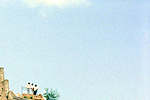 |
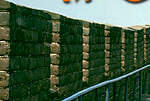 |
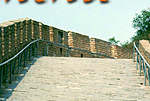 |
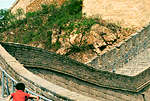 |
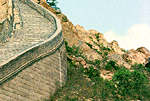 |
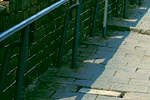 |
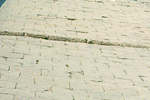 |
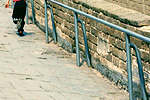 |
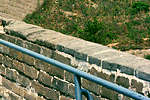 |
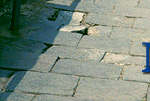 |
 |
 |
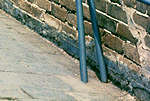 |
|
September 18, 2001 Watching
the Disaster
|
|
In the days that followed it was hard to get a gauge of what people were really thinking. Every cab driver in Chongqing gabbed about Afghanistan's imminent butt-whipping, but a true opinion was not forthcoming. Chinese really love face (i.e. pride) and respect the face of even the hairiest foreigner – so a foreigner will rarely hear frank opinions about his own country. But soon enough the people I know and the cabbies who I got to laugh opened up and let it all out. Many of them, if they're honest, feel America got what it deserved. But in the same breath my friends and "chauffeurs" would denounce terrorism, chaos, Islam and any attack on innocents. The act itself is abhorred by any upstanding Chinese who knows his history, but there is little love to spare for a government that all remind me was behind the bombing of the Chinese Embassy in Belgrade, the downing of a Chinese jet and the continual support of Taiwan and to a lesser extent Tibet. A friend of mine went out with his friends the night of the 11th and celebrated. He told me this seconds after he asked after my family and friends and expressed his sorrow for the innocents who died. We talked for a bit. The same distinction made in almost every conflict with America was made here: the people of America – the people of any country – never deserve to be murdered for deeds perpetrated by their government, no matter how representative that government claims to be. Tolerance of religion, even Buddhism, is a most recent phenomenon in China. Monasteries throughout the country were ransacked up until the '70s and to speak to a Christian priest, propagate Christianity and even to visit a church was a crime punishable by death. Muslims ("Huizu") have been in China for ages and even established a powerful kingdom in Yunnan in the 13th century. But these Muslims have been "in the fold" long enough to have accepted Mandarin as their language – they "bother no one" The word Huizu implies a blood-minority of the Chinese nation. Other Muslims are called Islanjiao – "of the Islam religion." Uigher Muslims are a different breed, altogether. They have the audacity to grumble in private about their most recent "liberation" and they still speak Turkish or Uigher. They even decide to blow up a bus every now and then. "These people have violence in their blood," says Liu Sifu over drinks and smokes. "Their religion is not a peaceful one." Liu Sifu is all for America bombing the hell out of Afghanistan. He reveres America for the very virtues Bush claims to be defending from monstrous evil. The very virtues which supposedly drive Muslims to envy and kill us. Liu Sifu remembers not being able to discuss anything for fear of the government – he holds America responsible for the relative freedom many Chinese enjoy today. Just as the views on America differ from person to person here, so do the views on the tragedy in New York. Generally, US foreign policy is despised, extreme Islam is feared and terrorist acts are abhorred. The suicide mission is considered either retribution for America's past crimes or murder of innocent civilians or both. However, regardless of a person's opinion of America or the tragedy, swift retaliation seems to be endorsed by the majority. Face, again, is a factor. How can Bush (or America) ever face the world and still claim to be the most powerful nation, the "world's policeman," if he does not crush those who killed his people? "Bush has lost face," says Taiwanese businessman Huang Xianshen. "How could he let this happen?" For Bush to sit at a table with Arafat and bin Laden and discuss American foreign policy improvements instead of using force would show weakness and fear. A Chinese proverb says, "Hide your broken arm in your sleeve" (i.e. never show weakness). According to this maxim, what should one do with a powerful right arm after receiving a black eye? Another reason why many Chinese support retaliation is the proximity of rebels, dissidents and other "troublemakers," as well as China's history with foreign aggression and domestic unrest. Any threat to the government's legitimacy in China is ruthlessly suppressed, exiled or co-opted. Falun Gong members and late '80s activists were and still are being beaten, jailed, executed and forced underground by a fearful and relentless government. The populace, especially in the case of the Falun Gong, strongly supports the government. Unrest and instability are words that strike fear into the heart of many Chinese – they smack of weakness, and history has shown what happens in China if the central government is weak: insurrections and invasions. Taiwanese are barraged daily with "miraculous peaceful unification" slogans, curses hurled at Taiwanese President Chen Shui Bien and bans of this and that artist's work if it opposes Beijing in any way. Exiled monk-leaders, a large military presence and a mass influx of Han Chinese taking positions of wealth and influence work to cow Tibet, and similar tactics prevail in Xinjiang, home of the Uighers. Russia, China and several Central Asian countries recently created the Shanghai Cooperation Organization (SCO) which was founded for the most part to coordinate the member-country's anti-terrorism efforts. The Chinese government sees "extremist Islam"as a potential catalyst for insurrection in Xinjiang and will do everything it can to stabilize its borders and maintain order and control of resource-rich Xinjiang. One members of the SCO, Uzbekistan, is a source of worry for Chinese officials. A rebellion led by Uzbek Muslims has spilled over to Kyrgyzstan, and Taliban fighters are suspected of playing a role. Incidentally, Uzbekistan has offered up its land as a possible staging point for the US war-machine. The Chinese government and much of the populace have no love for threats and this helps to explain why support of retaliation drowns out any shouts of celebration. But the destruction of the Taliban may or may not be a boon for the Chinese. Fleeing guerrilla fighters and angry Muslims might not be pillars of stability on China's western borders. The Chinese government is politically astute enough not to provoke military (or any other) conflict with a country whose strength they respect and whose economic partnership they need. Nevertheless, Chinese will watch with interest the struggle between Islam and the West, not only for national security concerns, but perhaps also to see how Islam fairs in a battle with the almighty West. |
Text-only printable version of this article Sascha Matuszak
is a teacher living and working in China. His articles have appeared
in the South China Morning Post, the Minnesota Daily,
and elsewhere. His exclusive Antiwar.com column appears Tuesdays. Archived columns Cheating
as a Way of Life China's
Internet Generation Free
Markets or Supermarkets Sailing
Towards World Significance China's
Youth Revolution |
Please Support Antiwar.comSend contributions to Antiwar.com or
Contribute Via our Secure Server |
|
